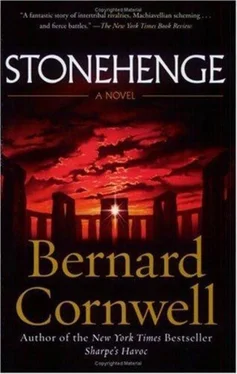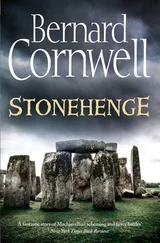That was the day the stranger came to the Old Temple in the storm, and the day Lengar tried to kill Saban, and the day everything in Ratharryn's world changed.
—«»—«»—«»—
The storm god raged across the earth that night. Rain flattened the crops and made the hill paths into streamlets. It flooded the marshes north of Ratharryn and the River Mai overflowed her banks to scour fallen trees from the steep valley that twisted through the high ground until it reached the great loop where Ratharryn was built. Ratharryn's ditch was flooded, and the wind tore at the thatch of the huts and moaned among the timber posts of its temples' rings.
No one knew when the first people had come to the land beside the river, nor how they had discovered that Arryn was the god of the valley. Yet Arryn must have revealed himself to those people for they named their new home for him and they edged the hills around his valley with temples. They were simple temples, nothing but clearings in the forest where a ring of tree trunks would be left standing, and for years, no one knew for how many, the folk would follow the wooded paths to those timber rings where they begged the gods to keep them safe. In time Arryn's people cleared away most of the woods, cutting down oak and elm and ash and hazel, and planting barley or wheat in the small fields. They trapped fish in the river that was sacred to Arryn's wife, Mai, they herded cattle on the grasslands and pigs in the patches of woodland that stood between the fields, and the young men of the tribe hunted boar and deer and aurochs and bear and wolf in the wild woods that had now been pressed back beyond the temples.
The first temples decayed and new ones were made, and in time the new ones became old, yet still they were rings of timber, though now the rings were trimmed posts that were raised within a bank and ditch that made a wider circle around the timber rings. Always a circle, for life was a circle, and the sky was a circle, and the edge of the world was a circle, and the sun was a circle, and the moon grew to a circle, and that was why the temples at Cathallo and Drewenna, at Maden and Ratharryn, indeed in nearly all the settlements that were scattered across the land, were made as circles.
Cathallo and Ratharryn were the twin tribes of the heartland. They were linked by blood and as jealous as two wives. An advantage to one was an affront to the other, and that night Hengall, chief of the people at Ratharryn, brooded on the gold of the Outfolk. He had waited for Lengar to bring him the treasure, but though Lengar did return to Ratharryn with a leather bag, he did not come to his father's hut and when Hengall sent a slave demanding that his son bring him the treasures, Lengar had answered that he was too tired to obey. So now Hengall was consulting the tribe's high priest.
'He will challenge you,' Hirac said.
'Sons should challenge their fathers,' Hengall answered. The chief was a tall, heavy man with a scarred face and a great ragged beard that was matted with grease. His skin, like the skin of most folk, was dark with ingrained soot and dirt and soil and sweat and smoke. Beneath the dirt his thick arms bore innumerable blue marks to show how many enemies he had slain in battle. His name simply meant the Warrior, though Hengall the Warrior loved peace far more than war.
Hirac was older than Hengall. He was thin, his joints ached and his white beard was scanty. Hengall might lead the tribe, but Hirac spoke with the gods and so his advice was crucial. 'Lengar will fight you,' Hirac warned Hensall.
'He will not.'
'He might. He is young and strong,' Hirac said. The priest was naked though his skin was covered with a dried slurry of chalk and water in which one of his wives had traced swirling patterns with her spread fingers. A squirrel's skull hung from a thong about his neck, while at his waist was a circlet of nutshells and bear's teeth. His hair and beard were caked with red mud that was drying and cracking in the fierce heat of Hengall's fire.
'And I am old and strong,' Hengall said, 'and if he fights, I shall kill him.'
'If you kill him,' Hirac hissed, 'then you will have only two sons left.'
'One son left,' Hengall snarled, and he glowered at the high priest for he disliked being reminded of how few sons he had fathered. Kital, chief of the folk at Cathallo, had eight sons, Ossaya, who had been chief of Madan before Kital conquered it, had fathered six, while Melak, chief of the people at Drewenna, had eleven, so Hengall felt shamed that he had only fathered three sons, and even more shame that one of those sons was a cripple. He had daughters too, of course, and some of them lived, but daughters were not sons. And his second son, the crippled boy, the stuttering fool called Camaban, he would not count as his own. Lengar he acknowledged, and Saban likewise, but not the middle son.
'And Lengar won't challenge me,' Hengal declared, 'he won't dare.'
'He's no coward,' warned the priest.
Hengall smiled. 'No, he's no coward, but he only fights when he knows he can win. That is why he will be a good chief if he lives.'
The priest was squatting by the hut's central pole. Between his knees was a pile of slender bones: the ribs of a baby that had died the previous winter. He poked them with a long chalky finger, pushing them into random patterns that he studied with a cocked head. 'Sannas will want the gold,' he said after a while, then paused to let that ominous statement do its work. Hengall, like every other living being, held the sorceress of Cathallo in awe, but he appeared to shrug the thought away. 'And Kital has many spearmen,' Hirac added a further warning.
Hengall prodded the priest, rocking him off balance. 'You let me worry about spears, Hirac. You tell me what the gold means. Why did it come here? Who sent it? What do I do with it?'
The priest glanced about the big hut. A leather screen hung to one side, sheltering the slave girls who attended Hengall's new wife. Hirac knew that a vast treasure was already concealed within the hut, buried under its floor or hidden under heaped pelts. Hengall had ever been a hoarder, never a spender. 'If you keep the gold,' Hirac said, 'then men will try to take it from you. This is no ordinary gold.'
'We don't even know that it is the gold of Sarmennyn,' Hengall said, though without much conviction.
'It is,' Hirac said, gesturing at the single small lozenge, brought by Saban, that glittered on the earth floor between them. Sarmennyn was an Outfolk country many miles to the west, and for the last two moons there had been rumours how the people of Sarmennyn had lost a great treasure. 'Saban saw the treasure,' Hirac said, 'and it is the Outfolk gold, and the Outfolk worship Slaol, though they give him another name…' He paused, trying to remember the name, but it would not come. Slaol was the god of the sun, a mighty god, but his power was rivalled by Lahanna, the goddess of the moon, and the two, who had once been lovers, were now estranged. That was the rivalry that dominated Ratharryn and made every decision agonizing, for a gesture to the one god was resented by the other, and Hirac's task was to keep all the rival gods, not just the sun and the moon, but the wind and the soil and the stream and the trees and the beasts and the grass and the bracken and the rain, all of the innumerable gods and spirits and unseen powers, content. Hirac picked up the single small lozenge. 'Slaol sent us the gold,' he said, 'and gold is Slaol's metal, but the lozenge is Lahanna's symbol.'
Hengall hissed, 'Are you saying the gold is Lahanna's?'
Hirac said nothing for a while. The chief waited. It was the high priest's job to determine the meaning of strange events, though Hengall would do his best to influence those meanings to the tribe's advantage. 'Slaol could have kept the gold in Sarmennyn,' Hirac said eventually, 'but he did not. So it is those folk who will suffer its loss. Its coming here is not a bad omen.'
Читать дальше
Конец ознакомительного отрывка
Купить книгу












